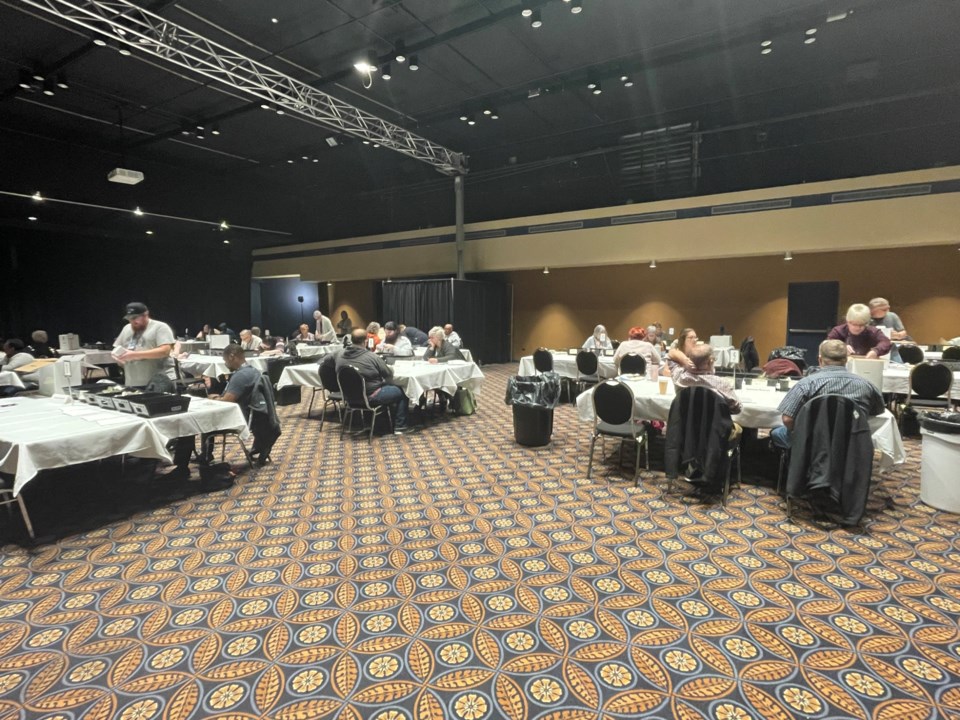REGINA - Elections Saskatchewan has started its Second Preliminary Count, where over 20,000 mail-in ballots are being counted on Wednesday.
Elections Saskatchewan volunteers and workers are currently counting the mail-in ballots at the Conexus Arts Centre in Regina.
The ballot counts could lead to nine different constituencies seeing a change in which party and candidate will win each respective riding.
Michael Boda, Chief Electoral Officer, outlined the nine ridings currently in a tight race. “It's [the nine close ridings are] Saskatoon Â鶹´«Ã½AVeast, Saskatoon Willowgrove, Regina Wascana Plains, Saskatoon Silverspring-Sutherland, Saskatoon Westview, Saskatoon Chief Mistawasis, Prince Albert Northcote, Regina University, and Regina Rochdale.”
Of those nine constituencies, the New Democrats currently have the lead in seven of those ridings. The ridings the NDP does not lead in currently is Prince Albert Northcote and Saskatoon Willowgrove, while today's mail-in counting indicates Saskatoon Westview has flipped to the NDP.
While winning those will not change the Saskatchewan Party’s majority, it can be considered a victory for the NDP. Vice versa, the Sask Party taking any seats in the two major cities of Regina and Saskatoon would help ease the pain of losing seats.
There is also a possibility of over 10,000 more ballots being available for counting, which can shift the election results. Boda said over 32,000 people applied for the mail-in ballots, while Elections Saskatchewan has only received 20,417.
With all these ballots, several outcomes are possible, including a tie, a close margin of victory and a candidate requesting a recount.
In the event of a tie, Elections Saskatchewan will recount the votes.
Another outcome is the margin of victory being smaller than both rejected and objected ballots. Boda explained each constituency has a different number for a margin of victory. The number is dependent on the rejected and objected ballots. Objected ballots mean a party has objected to using a particular ballot. So, if the number of rejected and objected ballots is larger than the margin of victory, Elections Saskatchewan can recount the riding.
The third outcome is a candidate has reasons laid out in the legislation and can ask a judge for a recount.
Regarding election night, Boda was asked numerous questions about voting and why ballots from the cities took longer to count.
He noted the cities have more ballots to count and Elections Saskatchewan employees teams of helpers ready to assist voting stations during the election if needed.
However, Boda pointed to unforeseen challenges occurring on election night. He mentioned that 300 workers called in sick due to contracting the flu during the 2016 election.
Reporters asked Boda if he would consider using tabulators during the next provincial election. Other provinces that had their provincial election, like British Columbia, saw results come in sooner due to their voting system using tabulators.
Boda said, “I'm going to hold off on making a recommendation at this point. I really do want to look at the data. We will be doing survey research of our voters, of our workers, and of the political stakeholders as well. We'll listen very carefully as to what expectations are and pull that together.”
He did note the 2023 by-elections had faster results when those elections used tabulators.
The 2024 election saw a turnout of 53 per cent of the voters in the province. Elections Saskatchewan also reported higher average turnout rates for early voting during Election Week. Boda said the overall turnout could jump to 56 per cent once all the ballots are counted.
He felt encouraged by the overall turnout numbers but said it is important to engage others in politics, like the younger generations and new citizens of Canada.
After today, the Final Count for ballots is on Nov. 9.




